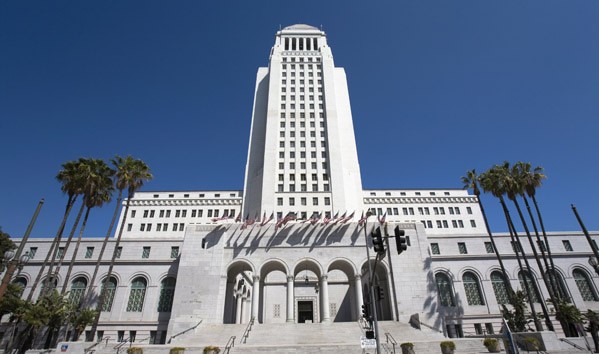City Council President Herb Wesson also moves forward with his promise to make full licensing, social equity, local banking, and other changes to the draft regulations the law of the land in Los Angeles. 
LOS ANGELES – Less than 24 hours after holding a special meeting of the Rules, Elections, and Intergovernmental Relations Committee that packed the chambers with motivated members of the cannabis industry and many others, Los Angeles City Council President Herb Wesson presided over a regular session of the full City Council that made history by approving Cat Packer to become the permanent executive director of the city’s new Cannabis Department. The vote was 13-0, with Paul Koretz and Curren Price absent.
Packer, 26, an attorney who has served as a campaign coordinator for the Drug Policy Alliance, first came to the city’s attention last year when she made a comment during a public meeting that so impressed Wesson that he sent an aide to track her down before she could leave the building. Since then, Packer’s knowledge of the industry and personal resolve to pursue a social equity-based licensing system for the city has served to reinforce a stellar reputation with the city and within the industry, leading Mayor Garcetti to ultimately nominate her to become the first-ever head of a brand-new city bureaucracy.
Also approved by the same vote margin Wednesday were Garcetti’s five nominees to serve with Packer as commissioners. They are, as noted by the Los Angeles Times, “Robert Ahn, a former planning commissioner; Rita Villa, a certified public accountant; Philip D. Mercado, regional chief of general surgery at Southern California Permanente Medical Group; Misty Wilks, an attorney; and Victor Narro, a former member of the police commission’s Police Permit Review Panel.”
That was the only cannabis business addressed Wednesday, but Tuesday evening, during a meeting of the Rules committee that started just after 6pm and ran almost until 9pm, Wesson, along with fellow City Council members Jose Huizar and Marqueece Harris-Dawson, made significant progress in putting the industry’s mind to rest regarding parts of the city’s initial draft regulations that everyone in the industry found wanting, most pointedly the plan to issue condition use permits instead of full licenses.
Wesson, in an August 3 letter to the city’s Department of Planning, had already communicated his intention to correct the licensing problem and other essential provisions, but Tuesday afforded the first opportunity for the industry to speak publicly on Wesson’s efforts on its behalf, and the appreciation was palpable.
“Thank you for listening to us,” said Ariel Clark, an attorney with Clark Neubert, LLP and founder and chair of the Los Angeles Cannabis Task Force. Clark said she was thrilled with Wesson’s plan to pursue full licensing and a city-owned bank that would serve the industry, but also noted a few remaining concerns.
“It’s really important that businesses have provisional licenses and the ability to have some sort of safe harbor as we are figuring things out,” she said. “It looks like we’ll be ready to apply to the state by January 1, but those folks – like cultivation, delivery and manufacturing – really need provisional licensing as well as a very wide door for many operators to walk through, through the social equity program that also benefits veterans, women, people of color, so we can have a diverse industry that reflects L.A.”
Other groups represented Tuesday night at the mike included members from the Southern California Coalition, the United Cannabis Business Association, the California Minority Alliance, the Cultivators Alliance, Commercial Workers Local 770, and the Greater Los Angeles Collective Alliance.
In addition to provisional licenses and social equity, speakers also addressed concerns that remain about land use provisions as well as making sure that law enforcement does not target otherwise law-abiding businesses during the time-period leading up to full licensing. Several speakers also expressed concern that the needs of patients will be lost in the rush to take care of businesses, including the ability of people who depend on cannabis as life-saving medicine to be able to continue to afford their medication. Wesson assured the crowd that their concerns would be assessed and addressed in the evolving final draft regulations before it is forwarded to the city council for approval.
“Cannabis is keeping me alive every day of my life, but if the prices go up the way they are suggesting I will not be able to afford to live anymore,” said one speaker, whose voice broke as she recounted her battle with breast cancer. “In January, they said I would be dead in six months. That day was July 27. I am here in front of you with 90 percent remission in my body.”
In his August 3 letter, Wesson requested:
– That the city move forward with a legal licensing/permitting system that is in conformance with state law and provides certainty for the commercial cannabis industry
– That the Type 7 -Manufacturer 2 license/permit be allowed and provided in the same zones and under the same provisions as a Type 6 -Manufacturer 1 license/permit.
– That the following licenses/permits be allowed under the City’s Zoning Code in A1, A2, and RA zones to provide City residents to participate in, and the Cannabis Department the opportunity to regulate, these areas of cultivation: Type 1 – Cultivation, Specialty Outdoor, Small; Type 1B – Cultivation, Specialty Mixed-Light, Small; Type 1C- Cultivation, Specialty Cottage, Small; Type 2- Cultivation, Outdoor, Small; Type 2B- Cultivation, Mixed-Light, Small; Type 3B- Cultivation, Mixed-Light, Medium.
– That a license/permit for a Type 8-Testing laboratory be allowed in the same zoning areas that are proposed for the Type 10-Retailer license/permit.
– That the use of a CEQA exemption under state law provides the best opportunity for the expedient enactment of ordinances and regulations by the City Council to allow the Cannabis Department to begin processing applications this calendar year.
– That the Land Use Review option be removed in order to provide certainty for the industry and the City Council to move forward with the proposed regulatory process.
– That an urgency clause be included in the draft ordinance.












[…] “Now is no time for incrementalism or half-stepping,” Harris said in 2020, according to DPA Director of Drug Markets and Legal Regulation Cat Packer. […]